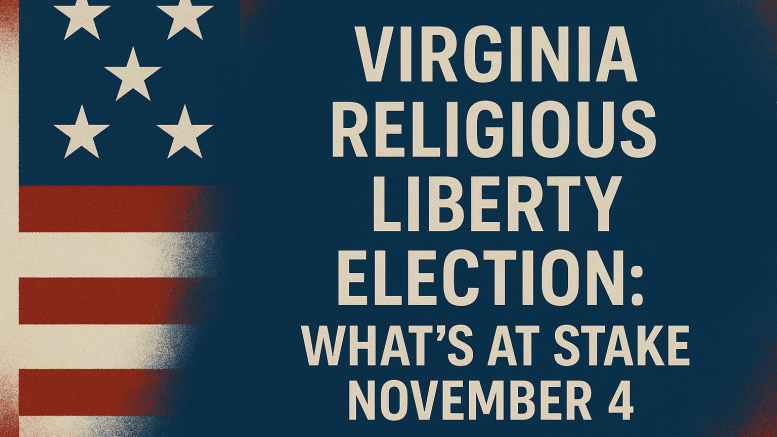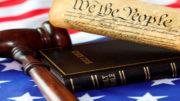Dear Christian:
As we continue our series on Virginia Christian voters for the upcoming election, today we’re examining one of the most critical issues at stake: religious liberty.
The Supreme Court building stands as a monument to the rule of law, its marble columns bearing witness to generations of Americans seeking justice. However, in recent years, those halls have echoed with a troubling question our Founders never anticipated: Can the government compel citizens to violate their deeply held religious convictions?
This isn’t theoretical for Virginia. In fact, the Virginia religious liberty election on November 4th will determine whether Christians can operate businesses, run adoption agencies, provide counseling, practice medicine, and educate children according to biblical conviction—or whether the state will force conformity to ideologies that contradict Scripture.
The reality is that religious liberty in America is under unprecedented assault. Moreover, the candidates running for Virginia governor hold radically different views on whether Christians deserve broad protections or narrow accommodations. One vision protects conscience. The other punishes it.
Consequently, before you cast your vote, you need to understand what’s truly at stake in this Virginia religious liberty election.
What Does the Bible Say About Religious Liberty?
Let’s start with the foundation. Does God compel faith, or does He protect human choice?
Jesus made His position crystal clear when He instructed His disciples:
“And if anyone will not receive you or listen to your words, shake off the dust from your feet when you leave that house or town.” (Matthew 10:14)
Notice what Jesus did NOT say. He didn’t command: “Force them to listen. Use government power to compel agreement. Punish those who reject your message.”
Instead, Jesus insisted on personal choice and non-coercion of religious beliefs. If people reject the gospel, you move on. You don’t legislate conformity. Furthermore, this principle of voluntary faith is woven throughout Scripture.
The Apostle Paul wrote: “The aim of our charge is love that issues from a pure heart and a good conscience and a sincere faith” (1 Timothy 1:5). Notice the word “sincere.” Faith coerced isn’t sincere—it’s performance under duress. Therefore, God values authentic belief freely chosen, not external compliance mandated by law.
This is why religious liberty matters so much in this Virginia religious liberty election. When government forces Christians to affirm what Scripture calls sin, or punishes them for living according to biblical conviction, it attacks the very nature of authentic faith that God desires.
The Three Visions of Religious Liberty in This Virginia Election
Understanding the Virginia religious liberty election requires seeing the three distinct philosophies at war:
1) Biblical Vision: Freedom of Conscience
The biblical view protects robust religious liberty in all spheres of life:
- Christians can operate businesses according to biblical ethics
- Religious organizations can hire and serve consistent with their beliefs
- Medical professionals can decline procedures that violate conscience
- Parents can educate children according to faith
- Churches can preach biblical truth without government interference
Moreover, this freedom extends beyond church buildings into everyday life. You don’t “check your faith at the door” when you enter the public square. Instead, religious conviction shapes how you work, serve, create, and engage your community.
2) Marxist Vision: Abolish Religion
Here’s what many don’t realize about the ideological roots of religious liberty opposition. Karl Marx openly declared: “My object in life is to dethrone God and destroy Capitalism… The first requisite for the happiness of the people is the abolition of religion.”
Vladimir Lenin added: “Religion is the opium of the people—this dictum by Marx is the cornerstone of the whole Marxist outlook on religion. Marxism has always regarded all modern religions and churches, and each and every religious organisation, as instruments of [middle class] reaction that serve to defend exploitation and to befuddle the working class.”
Notice the goal: Marxism sets itself against God and seeks to limit religious expression. Why? Because you cannot serve both God and the State. One authority must bow to the other. Consequently, Marxist ideology always moves toward restricting, containing, and ultimately eliminating religious influence from public life.
3) The Current Democratic Platform Position
Now, here’s where the Virginia religious liberty election gets critical. The Democratic platform states:
“[We] will protect the rights of each American for the free exercise of his or her own religion [and] advocate for religious freedom throughout the world.”
That sounds reasonable. However, read the next line carefully:
“[We] believe in the paramount importance of maintaining the separation between church and state.”
And most tellingly:
“[We] reject broad religious exemptions.”
Let that sink in. They explicitly reject broad religious exemptions. In other words, they support religious freedom—but only within narrow boundaries they define. Furthermore, they want to keep religious expression separate from public life (“separation of church and state”).
This isn’t the Marxist position of abolishing religion. However, it’s a step in that direction. It says: “You can believe what you want in private, but when your beliefs conflict with our ideology in public, your beliefs must yield.”
The Republican Platform Position
In contrast, the Republican platform in this Virginia religious liberty election states:
“We pledge to defend the religious beliefs and rights of conscience of all Americans and to safeguard religious institutions against government control… We strongly support the freedom of Americans to act in accordance with their religious beliefs, not only in their houses of worship, but also in their everyday lives.”
Additionally:
“[We affirm] that religious individuals and institutions can educate young people, receive government benefits, and participate in public debates without having to check their religious beliefs at the door.”
The contrast is clear. One platform says “broad exemptions” are problematic. The other says religious freedom should be protected broadly, in everyday life, not just in church buildings.
What “Rejecting Broad Religious Exemptions” Means for Virginia Christians
Let’s make this concrete. When a platform rejects “broad religious exemptions,” here’s what happens in practice:
Christian Business Owners: A Christian baker, florist, or photographer who cannot in good conscience create art celebrating same-sex marriages faces lawsuits, fines, and business closure. Furthermore, the state labels this “discrimination” rather than conscience protection.
Adoption Agencies: Catholic Charities and other faith-based adoption agencies that place children with married mother-father families (following 2,000 years of Christian teaching) are forced to either violate their convictions or close their doors. Consequently, thousands of vulnerable children lose excellent placement services.
Christian Counselors: Counselors who offer biblical guidance on sexuality and gender—helping clients align their lives with Scripture—face state licensing threats. Some states have already banned such counseling for minors. Therefore, parents cannot even seek Christian counseling for their own children.
Healthcare Workers: Christian doctors and nurses who cannot perform abortions or participate in gender transition procedures for religious reasons face discrimination, job loss, and professional consequences. Moreover, their licenses may be threatened.
Christian Schools: Religious schools that maintain biblical standards for marriage, sexuality, and gender face loss of accreditation, tax-exempt status, and eligibility for school choice programs. In addition, they may be forced to hire staff who reject their religious mission.
This is what “rejecting broad religious exemptions” looks like. It means your faith is free—as long as it stays private, silent, and separated from how you actually live.
The Virginia Religious Liberty Election: Where Candidates Stand
So where do Virginia’s gubernatorial candidates stand on religious liberty?
This is precisely what you need to research before the Virginia religious liberty election on November 4th. Specifically, ask:
Do they support broad religious exemptions?
- Will they protect Christian business owners who operate according to biblical ethics?
- Will they defend faith-based adoption agencies, schools, and counseling services?
- Will they safeguard healthcare workers’ conscience rights?
How do they view the relationship between faith and public life?
- Do they believe Christians must “check their faith at the door” in the public square?
- Will they protect churches’ freedom to preach biblical truth without government interference?
- Do they see religious conviction as discrimination, or as protected liberty?
What is their record?
- Have they supported religious liberty legislation in the past?
- Have they opposed measures that would restrict conscience protections?
- Do their donors and endorsements suggest genuine commitment to religious freedom?
Visit the Virginia Christian Voter Guide and examine:
- Family Foundation comparison charts on religious liberty positions
- Virginia Faith & Freedom Coalition candidate analysis
- Voting records of current office holders
Furthermore, look specifically at where candidates stand on:
- Religious exemptions in anti-discrimination laws
- Conscience protections for healthcare workers
- School choice that includes religious schools
- Parental rights in education
- Protections for faith-based organizations
The differences between candidates in this Virginia religious liberty election are not subtle. They represent fundamentally different visions of whether Christians can live out their faith in all areas of life.
Why This Virginia Religious Liberty Election Matters Eternally
Here’s what’s at stake beyond politics:
For your children: Will they grow up in a Virginia where Christian schools can operate freely, or where the state threatens religious education with regulatory pressure?
For your church: Will pastors face consequences for preaching biblical truth about marriage, sexuality, and gender? Will churches lose tax-exempt status for maintaining biblical membership standards?
For your livelihood: If you own a business, practice medicine, provide counseling, or work in education, will Virginia protect your right to operate according to biblical conviction?
For your witness: Can you live out your faith authentically in every sphere of life, or must you compartmentalize—Christian on Sunday, conformist the rest of the week?
For the gospel: When government punishes Christians for living according to Scripture, it sends a message: “Your God’s commands don’t matter here.” Consequently, the gospel itself is marginalized, deemed irrelevant to public life.
Moreover, this is precisely what Jesus warned about:
“Whoever causes one of these little ones who believe in me to sin, it would be better for him to have a great millstone fastened around his neck and to be drowned in the depth of the sea.” (Matthew 18:6)
When government forces Christians to participate in what Scripture calls sin—or punishes them for refusing—it causes believers to stumble. Therefore, the stakes in this Virginia religious liberty election are spiritual, not merely political.
Religious Liberty vs. “Separation of Church and State”
One more critical point: You’ll often hear that “separation of church and state” requires limiting religious influence in public life. However, this is a fundamental misunderstanding of American history.
The First Amendment states: “Congress shall make no law respecting an establishment of religion, or prohibiting the free exercise thereof.”
Notice two protections:
- No establishment: Government cannot create an official state church or force citizens to support one religion
- Free exercise: Government cannot prohibit religious practice
“Separation of church and state” was never meant to exclude religious conviction from public life. Instead, it prevents government control of religion and religious control of government. Furthermore, it protects religious minorities from state-sponsored persecution.
The Founders understood what Scripture teaches: Faith must be voluntary, sincere, and free. Consequently, they built protections into our Constitution.
However, when modern politicians invoke “separation” to justify rejecting “broad religious exemptions,” they’re twisting the Founders’ intent. They’re using constitutional language to achieve the opposite of what the Constitution protects.
This matters in the Virginia religious liberty election because candidates will use this language. Therefore, you need to understand what they actually mean.
Your Action Steps Before November 4
Here’s what you must do:
Step 1: Research Candidates on Religious Liberty Visit the Virginia Christian Voter Guide and examine where gubernatorial candidates stand specifically on:
- Religious exemptions
- Conscience protections
- Faith-based organization freedoms
- Parental rights
- Church freedoms
Step 2: Ask the Right Questions Don’t accept vague promises about “supporting religious freedom.” Instead, demand specifics:
- Do you support broad religious exemptions?
- Will you protect Christian business owners, adoption agencies, counselors, and healthcare workers?
- Do you believe religious conviction should be protected in all spheres of life, or only in private worship?
Step 3: Compare Their Records, Not Their Rhetoric Politicians say what voters want to hear. However, their votes and endorsements reveal truth. Look at:
- Past legislation they supported or opposed
- Organizations that endorse them
- Donors who fund their campaigns
Step 4: Pray for Wisdom “If any of you lacks wisdom, let him ask of God, who gives generously to all without reproach, and it will be given him.” (James 1:5)
Ask God to give you discernment in this Virginia religious liberty election. Pray that He would raise up leaders who will protect His people’s freedom to live according to His Word.
Step 5: Vote with Conviction On November 4th, vote for candidates who will protect broad religious liberty. Furthermore, help others understand what’s at stake by sharing this information with your church, small group, and family.
Tomorrow: Biblical Justice vs. “Social Justice”
The Virginia religious liberty election is just one piece of what’s being decided on November 4th. Tomorrow, we’ll examine another critical issue: the battle between biblical justice and the counterfeit “social justice” that’s infiltrating our culture and politics.
You’ll see how these issues connect—because when government rejects religious liberty, it’s often because it’s embraced an ideology that demands conformity to a different system of “justice” that contradicts Scripture.
“When the righteous increase, the people rejoice, but when the wicked rule, the people groan.” (Proverbs 29:2)
Virginia is deciding who will rule. Therefore, choose leaders who will protect your freedom to follow Christ without government punishment.
Research Candidates Now: Virginia Christian Voter Guide
We welcome thoughtful and respectful dialogue from all viewpoints. Comments must remain civil, relevant, and free of profanity, personal attacks, or mockery of Christian faith. Disagreement is allowed—disrespect is not.






What territory the devil acquires by spiritual warfare, the church surrenders as “political”…cowardice is costly! https://www.youtube.com/watch?v=S0ck5LMJoOw